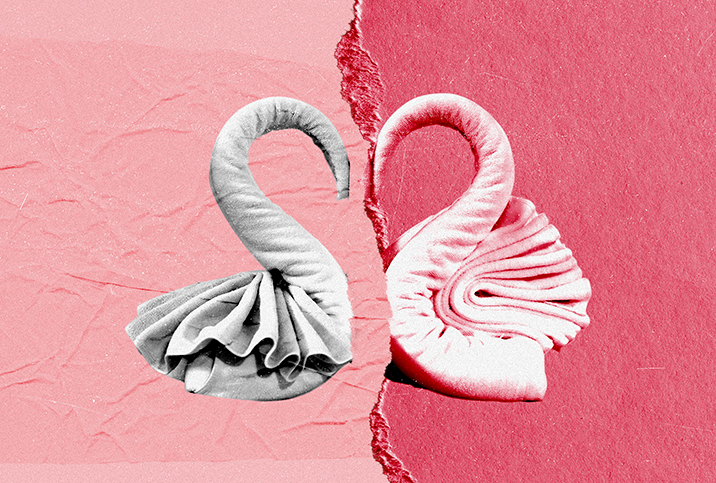Learn About Love From Prior Relationships

In 1948, famously paraphrasing the philosopher George Santayana, Sir Winston Churchill told the British Parliament, "Those who do not learn history are doomed to repeat it."
His address to British politicians could well have been about relationships.
It may be difficult to accept, but finding and cultivating love takes time. Yes, there are huge expectations when you start a new relationship, but that doesn't help if you develop feelings of disillusionment when everything ends and your inner dialogue says things like "I'm not lovable," "I'm tired of trying so hard" or "Perhaps I'll never fall in love."
The path of true love involves making mistakes, stumbling, failing and picking yourself up.
Think of this time as a brief chapter of mourning and introspection that could bring lucidity, wisdom, perspective, experience, inner strength and a better understanding of your sexuality.
"At some point in life, we have to close emotional cycles and prepare for new possibilities," said Ana Karina Araujo, a clinical psychologist and professor at Arturo Michelena University in Venezuela. "The truth is that after every breakup, an opportunity is generated to learn more about our emotional needs, preferences and discomforts."
Why did your relationship deteriorate?
What are the fundamental reasons that affective failures—negative developments in mood and emotion—occur in our relationships? Psychologists specializing in romantic relationships tell us to pay attention to our "personal inventory" so we can examine past loves and discover recurring patterns, allowing any introspection and self-knowledge to help us identify strengths and weaknesses.
Reciprocity
Romantic bonds are two-way streets and a reciprocal relationship maintains a balanced "give and take." Each partner is equally committed. They nurture each other and show eagerness, interest and empathy. Once a love relationship ends, specialists recommend examining the degree of reciprocity and commitment that existed between the parties.
"In good love, couples walk together, they go hand in hand," Araujo explained. "No one has to go ahead and no one has to lag behind. When there is a reciprocal bond, the needs of both are met equally. Fair appreciation, respect and support predominate. Lovers are truly involved."
Personal inventory:
- Do you consider yourself to be involved in balanced relationships?
- Did you and your former partner seek mutually satisfying solutions to problems?
- Was the intimacy reciprocal?
- Do you feel you gave and received equally?
Common interests
Relationship partners do not have to agree on everything. However, having similar core values and sharing common ground is advantageous in terms of emotional rapport, level of interaction and intimacy.
"Couples who share a similar philosophy of life and coincide in their beliefs tend to forge strong and lasting bonds," said Ermarina Jipsel Tortolero, a clinical psychologist who runs a private practice in Carabobo, Venezuela. "The existence of common interests facilitates decision-making, coexistence and also develops a support network between the parties. The couple is first and foremost a team, and when a breakup occurs, it is necessary to evaluate the interests, life plans and the vision of the future that the lovers had."
Personal inventory:
- What common projects did you have with your ex?
- Were your core beliefs congruent with those of your partner?
- Did you tend to sacrifice personal interests and goals for the sake of the love bond?
- Did the lack of similar tastes affect intimacy?
Sexuality
The relevance of sex depends on each romantic partner. For some people, sexuality is a vital component of an affectionate relationship. Other individuals, on the contrary, may find other forms of intimacy more valuable. After a separation, it is worthwhile to do some introspection in the area of sexual health.
We all know sexuality can become complicated over time. According to Tortolero, the loss of intimacy can be considerably detrimental to the satisfaction of many couples.
"Usually, sex strengthens the bond between lovers, as well as the level of commitment, and the feeling of companionship, connectedness and closeness," she explained.
Conversely, the absence of sexual relationships can lead to feelings of frustration, rejection, abandonment and even loneliness.
"Sexuality remains a matter of emotional connection and skin," Tortolero added. "Passion grows in the couple thanks to daily approaches, signs of attention, gestures of affection and support. In many cases, good sex is a consequence of a close relationship."
Personal inventory:
- Do you think your ex-partner took your sexual interests lightly?
- Did you share a similar sex drive?
- Were you satisfied with the sex life you led?
- How often did you inquire about your partner's intimate needs?
- What sexual fantasies did you find incompatible?
Communication skills
"It's all your fault! I've had it with you."
"You're impossible. I don't know why I stay with you."
Most conflictive situations in couples stem from misunderstandings, misrepresentations and faulty assumptions.
"In any intimate relationship, we have to learn to communicate openly and honestly, make decisions together, and listen empathetically," Araujo explained. "Naturally, if someone ignores, belittles or disrespects their partner's opinions, there is no way for love to evolve."
Additionally, devastating criticism, degradation of the other, defensiveness, avoidance and withdrawal behavior, and passive-aggressive actions are unhealthy communication patterns that must be re-educated.
Personal inventory:
- When you argued with your former partner, did you tend to invalidate their point of view?
- Did you listen with empathy?
- Did you try to understand what they were really saying?
- Did you postpone everyday conflicts by assuming an evasive attitude?
- What topics were uncomfortable for you, and why?
- Could you address sexual issues effectively?
- How often did you have a defensive attitude, and why?
Emotional security
Emotional security is one of the basic needs we all need for a healthy bond. When people feel emotionally secure with their partner they are able to show up authentically and express themselves comfortably.
Personal Inventory:
- Did you feel safe in your former romantic relationship?
- Did you feel that your partner fully trusted you?
- Were you willing to break down your personal barriers?
- To what extent did you let your former partner know private aspects of your life?
Everything has its positive side
Reflecting on failed relationships can have a positive and transformative effect on how you approach future ones. There are important lessons to learn about love and sexuality, and the answers are probably tucked away inside you. You just have to be brave and face them head-on.
"When the heart is broken, a person can and should incorporate the love loss as life learning. Instead of being trapped in a vicious cycle, repeating the same mistakes, people should make readjustments when necessary," Tortolero said.


















